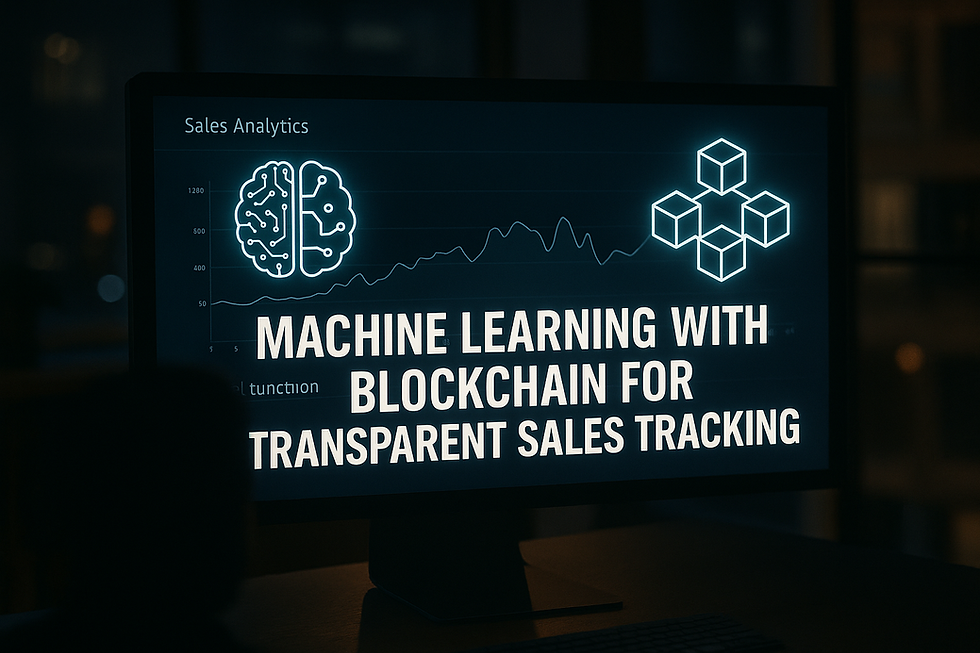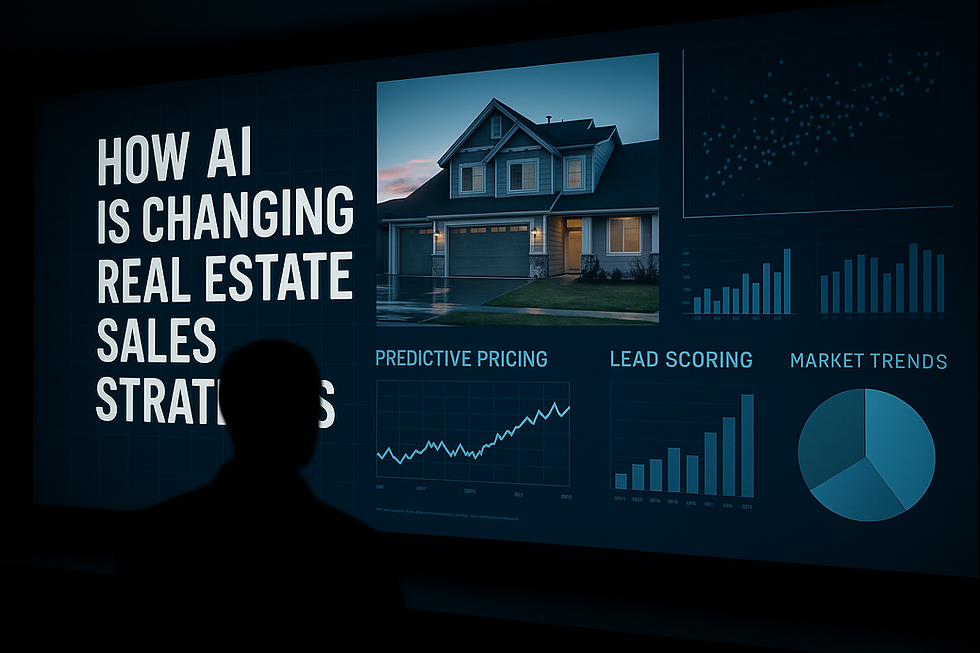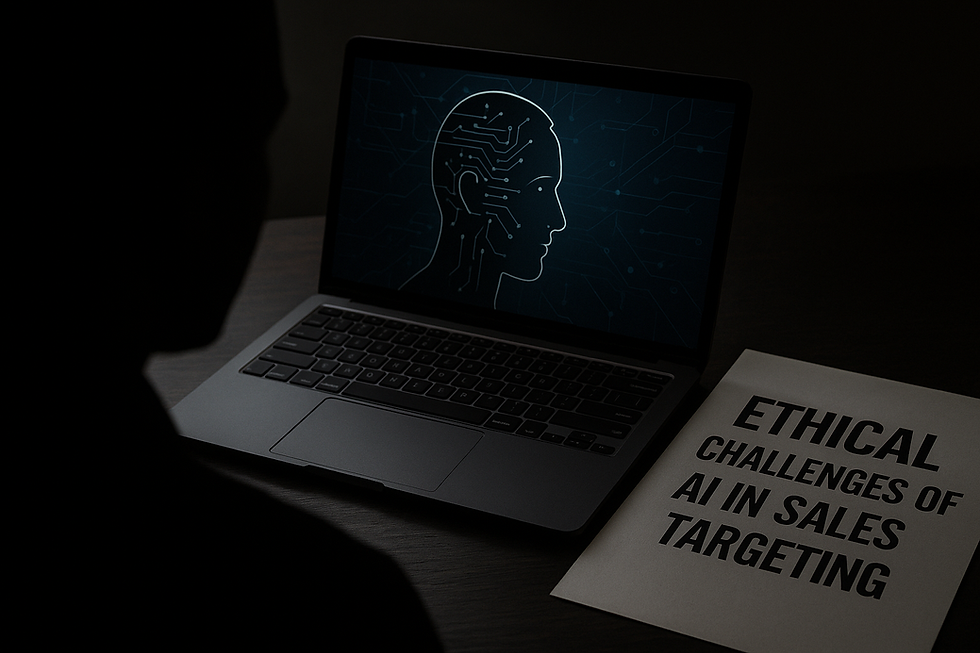Machine Learning with Blockchain for Transparent Sales Tracking
- Muiz As-Siddeeqi

- Aug 19, 2025
- 5 min read

Machine Learning with Blockchain for Transparent Sales Tracking
They said sales tracking was always going to be messy.
They said sales data would always be “a bit off.”
They said you could never get full transparency between partners, platforms, and pipelines.
But they were wrong.
Because today, something extraordinary is happening.
We are witnessing the fusion of two of the most powerful, most transformative technologies of our era—Machine Learning and Blockchain—to solve one of the oldest and most painful problems in sales: lack of visibility and trust in sales data.
And unlike many tech buzzwords that overpromise and underdeliver, this transformation is backed by real companies, real deployments, real research, and real results. This blog is not going to sell you hype. It’s going to show you how transparent sales tracking with machine learning and blockchain is not only real but already changing the way businesses work.
Bonus: Machine Learning in Sales: The Ultimate Guide to Transforming Revenue with Real-Time Intelligence
Where Traditional Sales Tracking Fails—Badly
Let’s get brutally honest for a moment.
Traditional sales tracking systems, even with modern CRMs like Salesforce, Zoho, or HubSpot, are riddled with gaps:
Manual errors from sales reps or distributors
Delayed entries that skew real-time analytics
Inconsistent formats between B2B partners
Lack of visibility across long and complex supply chains
Disputes over commission payouts and reseller revenues
Black box reports where nobody really knows how numbers were calculated
According to Forrester’s 2023 B2B Sales Report, 61% of businesses reported data discrepancies in their multi-party sales partnerships at least once per quarter. Another 38% admitted they completely lacked real-time sales visibility in their indirect sales channels.
These aren’t small problems. These are revenue-leaking disasters.
Enter Blockchain: Not Just for Crypto, But for Sales Trust
Let’s clear one thing upfront: Blockchain is not Bitcoin. Blockchain is the underlying decentralized ledger technology that records transactions in a tamper-proof, immutable way.
In the sales world, here’s what that means:
Every sales transaction—from the lead source, to the quote, to the contract, to the payment—is logged in an immutable blockchain ledger.
That ledger is accessible by all stakeholders (sales teams, distributors, partners, even regulators), but no one can secretly alter it.
Smart contracts can be programmed to automatically trigger commission payments, rebates, or loyalty bonuses once predefined sales milestones are met.
And this is not hypothetical.
Real Case: IBM + Blockchain + Sales Transparency
IBM partnered with Lenovo and GlaxoSmithKline to deploy blockchain-based sales supply chain visibility systems, where sales data from suppliers, wholesalers, and retailers were unified across parties. IBM reported a 75% reduction in sales data disputes and a 40% improvement in partner trust scores after blockchain deployment (IBM Blockchain Report, 2022).
And Then Comes Machine Learning—The Game-Changer on Top
Now imagine you have fully trustworthy data from blockchain. What happens when you unleash machine learning on that data?
You get predictive analytics that are actually reliable
You detect sales fraud or anomalies in real-time
You create next-best-action engines based on verified sales triggers
You build lead scoring models that know which channel really performed
You get dynamic commission optimization across partner ecosystems
In 2022, Accenture deployed an ML model over a blockchain-based supply chain dataset for a global consumer goods client. The result? A 13% improvement in sales forecast accuracy, and real-time detection of 18% more outlier transactions (Accenture Technology Vision, 2023).
Why This Matters for B2B and Channel Sales
In B2C sales, you often have a direct, simple transaction between buyer and seller. But in B2B sales, and especially in channel sales, the complexity multiplies:
A product may go from manufacturer → regional distributor → local wholesaler → reseller → end customer
Sales data gets fragmented across different ERPs, formats, and geographies
Commission plans vary across every link in that chain
Incentive abuse, ghost sales, or channel stuffing becomes hard to detect
But blockchain ensures data traceability, and machine learning finds the truth in the noise.
Unique Advantages of the ML + Blockchain Fusion for Sales Teams
Let’s be ultra-specific now. These are not theoretical benefits—they’ve already been documented in active deployments across companies worldwide:
1. Immutable Audit Trails for Sales Data
No more “he said, she said” between sales managers and partners. The blockchain ledger becomes the single source of truth.
2. Predictive Transparency
ML models can analyze sales patterns and detect likely revenue leakages, fraud attempts, or pricing manipulation before they affect quarterly earnings.
3. Dynamic Commission Settlement
With smart contracts, commissions are calculated and paid automatically based on verified blockchain events. ML helps optimize commission schemes based on rep performance, margin contribution, and customer retention.
4. Real-Time Supply Chain to Sales Analytics
From inventory logs to final sale, every data point is verified on blockchain and enhanced with predictive analytics for real-time sales decision-making.
Real-World Use Cases Already Live
Here are documented examples of companies using the ML + blockchain combo for transparent sales tracking:
Proven Example 1: Vodafone + Chainlink
Vodafone's Digital Asset Broker platform, launched with Chainlink, used blockchain and machine learning to facilitate automated, trusted transactions between machines and businesses. While its early use cases were in telecom and IoT, the same model has been piloted for sales micro-contracts in partner ecosystems (Chainlink 2023 Whitepaper).
Proven Example 2: Coca-Cola Amatil + Centra (SAP Blockchain)
Coca-Cola Amatil uses SAP’s blockchain system to track product movement and sales data across over 70 franchise bottlers, with machine learning applied to identify regional demand anomalies. They reported a 20% reduction in sales dispute resolution time (SAP Blockchain in Action, 2023).
Proven Example 3: Chronicled + MediLedger + Pharma Sales
In pharma, Chronicled’s MediLedger Network uses blockchain to record every sales and shipment event, and ML models to detect suspicious behavior in distributor networks. Used by Pfizer, Gilead, and McKesson. (MediLedger 2023 Industry Report)
The Infrastructure Stack: How It All Works Together
1. Sales Event Data Layer
This includes CRMs (Salesforce), eCommerce platforms (Shopify), and sales enablement tools (Outreach, Highspot).
2. Blockchain Ledger Layer
Ethereum, Hyperledger Fabric, or private consortium blockchains store verified sales transactions immutably.
3. Smart Contract Layer
Automates rules like incentive disbursement, margin checks, and compliance.
4. ML & AI Analytics Layer
Uses platforms like Amazon SageMaker, Azure ML, or Google Vertex AI to learn from blockchain-tracked data.
5. Sales Intelligence & Dashboarding
Real-time dashboards built on top of verified and ML-analyzed data (Power BI, Tableau, Looker).
Challenges? Yes. But Solvable.
Let’s not pretend it’s a magic wand. There are real challenges:
Integration complexity between legacy systems and blockchain nodes
Cost of blockchain operations (especially on public blockchains like Ethereum)
Data privacy laws that must be respected in cross-border sales
Change management resistance from sales teams used to older systems
But these are implementation challenges, not technological flaws.
Reports, News, and Research Worth Knowing
Here are real, referenced, recent sources backing this revolution:
IBM Blockchain & Supply Chain Sales Whitepaper (2022)
Accenture Technology Vision Report (2023)
SAP Blockchain Case Study: Coca-Cola Amatil (2023)
Chainlink Case File: Vodafone DAB (2023)
MediLedger Network Report (2023)
Gartner: Blockchain in Sales & Marketing Forecasts (2022)
Statista Report: Global Blockchain Spending in Sales by 2025—estimated $4.6B
The Future Is Sales Trust, Not Sales Spin
Imagine a world where your entire sales pipeline is not only automated and intelligent—but verifiable, traceable, and trusted by every party involved.
We’re not heading toward that future.
We’re already living in it.
Transparent sales tracking with machine learning and blockchain is no longer a fantasy or futuristic prediction. It’s a real competitive edge that’s already available to the teams bold enough to use it.
The only question is—are you one of them?

$50
Product Title
Product Details goes here with the simple product description and more information can be seen by clicking the see more button. Product Details goes here with the simple product description and more information can be seen by clicking the see more button

$50
Product Title
Product Details goes here with the simple product description and more information can be seen by clicking the see more button. Product Details goes here with the simple product description and more information can be seen by clicking the see more button.

$50
Product Title
Product Details goes here with the simple product description and more information can be seen by clicking the see more button. Product Details goes here with the simple product description and more information can be seen by clicking the see more button.






Comments